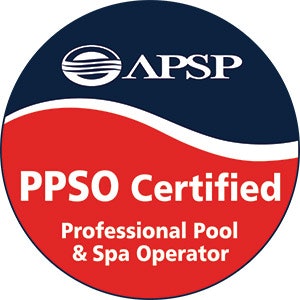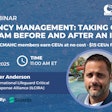
Fifteen years ago, the Association of Pool and Spa Professionals developed a training course aimed at helping commercial operators gain certification in states that required it. A few short years later, the association shelved the program. Now, after extensive updates and modifications, APSP is rolling out a new-and-improved version of the Professional Pool and Spa Operator course at this year's International Pool | Spa | Patio Expo in Orlando.
"We are responding to an industry need," says Rich Gottwald, APSP president and CEO. "Across the aquatic world, folks are asking for an easy-to-understand, simplified training course that prepares them to excel as a pool operator from day one. This course does just that — it has been developed by the industry for the industry."
The job of building and updating the PPSO course has been placed in the capable hands of Silvia Uribe, APSP senior manager of global training and education. Early in the process, Uribe and others at APSP, including Rich Gottwald, took a step back to consider whether there were improvements to be made that went beyond simply adding new information to the old manual.
Of course information on complying with the Virginia Graeme Baker Pool and Spa Safety Act, which became law after the first course and book were published, would go in. But maybe a fresh way of thinking could also help students better learn the information and be better equipped to do their jobs.
"We didn't want to force content into the program that we thought was good," Uribe says. "No. We looked at their needs, and from those needs we developed the new PPSO."
That idea — putting the students' needs first and working backwards from there — became the guiding principle behind all the changes the association made to the course.
"The program that we're launching is much different from the one we did 12 years ago," says Gottwald. "We've learned a lot from experience over the last dozen years and we've also learned a lot from listening to our members."
Perhaps the biggest change to the program, and the feature that sets it apart from other commercial certification training, is what's been taken out.

"What we've tried to do is keep it to the bare essential information that an operator needs," says Alex Antoniou, APSP's director of education content and workforce development. "So, while management information is nice to know, typically a pool operator is not a manager. They're running the pumps, filters, chemicals and so forth. They really have little managerial responsibility or renovation information. Is it important for an operator to know that? Well, it's nice to know, but at the end of the day the operator is not doing the renovation."
The focus, then, is on the core content, which includes the basics of filtration, water chemistry, testing, code compliance and troubleshooting.
"Basically it all revolves around bather health and safety," Antoniou says. "And that's ultimately what health departments are concerned about. So to have core information about disinfection, water clarity, turnover rates, flow rates, compliance with VGB, making sure drain covers are in place to reduce the risk of entrapment. That's what the operator really needs and that's what this program focuses on."
Gottwald simplifies the idea further: "When you go to work tomorrow, these are the things you need to know. The course is only focused on the actual tasks that need to be done to service a pool system.
"We've heard again and again from our members over the years that certification programs go down too many rabbit holes. Ours isn't going to do that."
According to Uribe, traditional certification courses can leave some students confused and unprepared to take what was taught in class and transfer it to the real world.
"That's a complaint I heard from health officials over and over again," she says. "Students go through a class, then they go into their jobs and discover that they have received so much information that the basics are lost, and it is difficult for them to determine what is really important."
"To fix that, and to lay out expectations, the PPSO handbook tells the students at the beginning of each chapter the 'must-know' information. Then the information is presented clearly and in a way that is relevant to the daily operation of a pool. At the end of each chapter there are questions that reinforce the objective that was introduced at the beginning of the chapter."
RELATED: APSP Launches New Industry Certification
Modular And Mobile
In addition to stripping away what it felt was extraneous information, APSP is offering the PPSO course in smaller pieces. Students who want to gain certification the old-fashioned way can still take the two-day course and exam in a traditional classroom setting. However, those who wish to take it piecemeal can also jump around and take modules that address specific topics.
Gottwald uses another APSP course to illustrate the point: "The next course we're going to launch is the updated Certified Maintenance Specialist program. You can go and sit through the whole thing, which is about 16 hours, and become a CMS. Or you can take one module tomorrow, one module next month, another the next month, and over the course of 13 months take them all and gain certification that way. One will be on electricity, one will be on chemistry, one will be on water dynamics. And you can jump around."
In addition to that flexibility, students seeking PPSO certification can now take half the course online, then show up to a single day of classroom instruction and take an exam. Uribe calls this the hybrid format.
"The student will be able to take the non-classroom part of the hybrid course from any media platform," she says. "It can be on a cell phone, on a tablet or on a computer. They don't have to be sitting behind a desk to take the online course; they can do it directly from their iPhones, making it a truly mobile learning system."
The multimedia aspect of the course is another example of the association listening to its members and providing materials that fit the lives and specific needs of the students, Gottwald says. In this case, it's largely input from millennials.
"Young people in the industry will say, 'Why do you print this stuff out? Can't I just get it electronically?'" he says. "So we're responding to that. Me, I have to print everything out and read it on paper. But God love 'em, they can actually read the book and take the online class using their phones."
Rollout
APSP will formally launch the PPSO program with a two-hour presentation at the Orlando show, during which Antoniou will give a demonstration of one of the chapters and Uribe will outline the course objectives and explain how one can become certified to instruct the course (see sidebar). A 280-page course book will be available for inspection or purchase, as will the electronic version.
"Our first face-to-face courses will be at the Southwest Pool & Spa Show in January, the Mid-America Pool and Spa Show in Nashville in February, the Western Pool and Spa Show in March and a course for NESPA in the Northeast, also in March," Uribe says. "Those are the courses that APSP is specifically going to sponsor. Now, that being said, we already have some instructors that are going to start teaching the program at their own locations. Once we launch the program in November we will have dates available on our website, and all of our instructors will have access to the materials to start teaching the PPSO course on January 1, 2018."
Seals Of Approval
Though the first class won't be offered until January, Uribe has been busy getting the course approved by officials in the states that require commercial pool operator training. Right now, there are 24 states, plus the District of Columbia, with such laws on the books. So far, Uribe says that APSP has obtained approval from 11; she's continuing to work to obtain approval from the other 13. Approval from all is expected by January 1.
"The state health officials need to ensure the materials have been updated," she says. "One of the things I do when I contact health departments is assure them that the program has been updated to comply with International Code and the CDC Model of Aquatic Health Code."
Once those priority states are lined up, the association will turn its attention to the 26 states that do not require commercial pool operator training and certification."
In 2004, APSP contacted every state and gained approval in 42 of them," Uribe says. "That's the approach I'm taking this time. I'm will sure our program is approved in writing in all of them. That way if they ever do require it, we are already approved."
"Whether a state requires it or not, an operator still has the duty of caring for the pool, and having a basic knowledge of pool operations and being able to verify that knowledge through certification can go a long way to satisfy any legal liability concerns," Antoniou says. "There'll be courses and people getting certified in all 50 states.
"And think about it. If you were an operator and were hired to run a facility, wouldn't you want to have a base knowledge on how to run it?"
Calling All InstructorsAPSP needs teachers for its PPSO course. Here's how to get involved APSP's Professional Pool and Spa Operator certification course is making a comeback after a 12-year hiatus, and the association has big plans for its implementation. APSP is prepping a marketing blitz, working with statehouses to secure approval and lining up dates at national and regional trade shows. None of these efforts amounts to anything, however, without qualified instructors to bring the information to students, Uribe says. "Our goal is to have instructors in every state to cover people's needs," she says. "With APSP chapters in most regions of the country we know there are going to be professionals that are qualified to teach the course." One way to get involved is to take a two-day training course, with dates and locations to be announced. There's another way, however, and it's one Uribe believes is unique. "We are going to have a reciprocity program," she explains. "So for someone who would like to become an instructor for us who is already an instructor for another private or public organization, they can fill out an application with us. If they can prove they have at least three years' experience in the aquatics industry and submit an instructor certificate, then we will honor that certification without them having to go through the training program." |





































